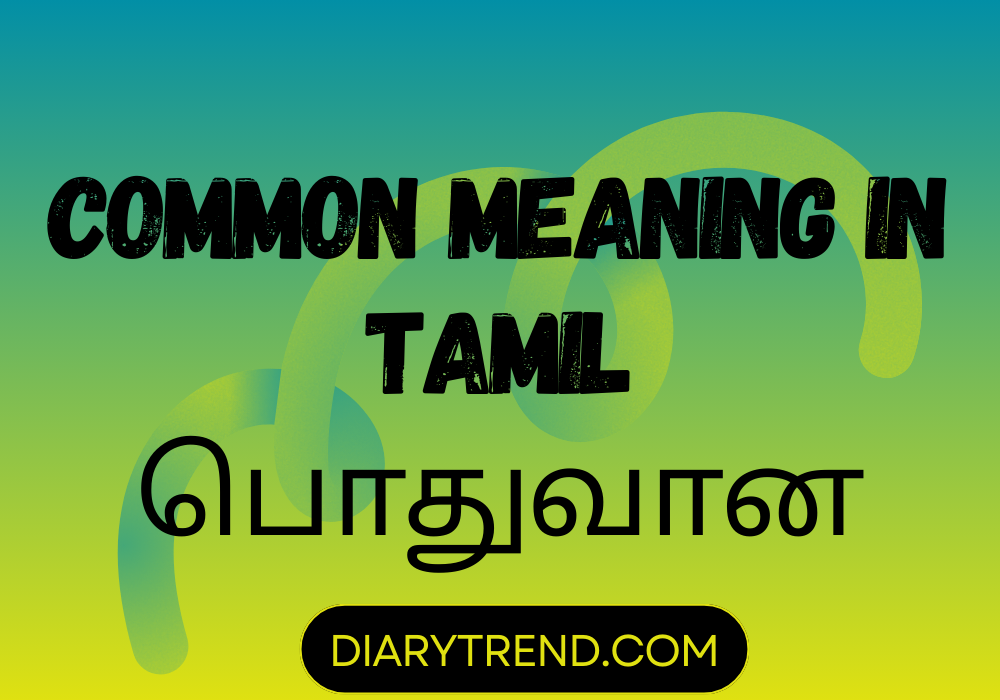The word “common” translates to “பொதுவான” in Tamil, a language rich in culture and history, spoken predominantly in the southern part of India and in Sri Lanka among other places. This article delves deep into the significance, usage, and multifaceted implications of the term “பொதுவான” within the Tamil linguistic landscape, cultural context, societal norms, and its relevance in various domains including law, education, and everyday communication.
Historical Context
The Tamil language, one of the oldest living languages in the world, boasts a literary tradition spanning over two millennia. The word “பொதுவான” encapsulates the concept of commonality, shared experiences, or universality, which has been a recurring theme in Tamil literature and philosophy. Ancient Tamil texts, such as the Sangam literature, frequently touch upon the idea of common human emotions, experiences, and societal values, underlining the interconnectedness of the Tamil people.
Linguistic Nuances
In Tamil, “பொதுவான” is not just a word but a concept that embodies inclusivity, universality, and shared identity. The term can be dissected into “பொது” (common, public, or general) and the suffix “ஆன” (related to or pertaining to), which together signify something that is widespread or universal. This term adeptly captures the essence of commonality across various spectrums—be it common ground in opinions, common areas in a community, or common rights in the realm of law.
Cultural Implications
The concept of “பொதுவான” deeply influences Tamil culture, promoting a sense of community and shared belonging. This is evident in the traditional Tamil way of life, where community events, festivals, and rituals are designed around the idea of bringing people together, fostering a sense of unity and shared purpose. The term also underscores the importance of common spaces, such as village squares (“ஊர் மைதானம்”) and temples (“கோயில்”), which serve as hubs for communal interaction and cultural exchange.
Societal Norms
In the context of societal norms and governance, “பொதுவான” plays a critical role. It is a principle that guides the management of common resources, communal rights, and public policies. The concept is integral to the Tamil ethos of collective welfare (“நல்லிணக்கம்”) and social justice, ensuring that resources, opportunities, and rights are accessible to all members of society, thereby reducing disparities and fostering social harmony.
Legal and Educational Domains
In legal terms, “பொதுவான” pertains to common law and public interest. It underscores the idea that justice and legal rights should be universally accessible, reflecting the principle of equality before the law. In the educational sphere, the term emphasizes the importance of public education and the right to knowledge and learning as universal entitlements. Educational policies and initiatives often focus on creating common standards and equitable access to education for all.
Everyday Usage
On a day-to-day level, “பொதுவான” finds its place in conversations about common interests, common problems, and the search for common solutions. It is a term that brings people together, encouraging dialogue, understanding, and collective action. Whether discussing “பொதுவான” issues at a community meeting or sharing “பொதுவான” experiences with friends, the term fosters a sense of solidarity and shared humanity.
Conclusion
The term “பொதுவான” encapsulates a profound and multifaceted concept that is central to Tamil culture, language, and societal ethos. It reflects the values of inclusivity, universality, and shared belonging, permeating various aspects of life from literature and culture to law, education, and everyday interactions. As the world becomes increasingly interconnected, the principles embodied by “பொதுவான” offer valuable insights into fostering unity, understanding, and collective well-being in a diverse global community.
